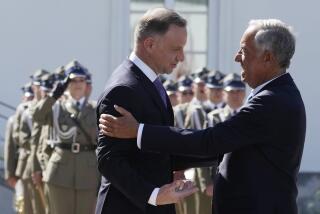NATO Ministers Reaffirm Goal to Modernize A-Arms
- Share via
SCHEVENINGEN, The Netherlands — The defense ministers of the North Atlantic Treaty Organization, avoiding what had threatened to be a serious rift with Belgium, on Friday reaffirmed the alliance’s commitment to modernizing its short-range nuclear weapons.
Earlier in the week, the Belgian government had expressed reluctance to accept a NATO planning group’s report saying the alliance must modernize its nuclear force.
But all 14 defense ministers endorsed the statement issued Friday after a two-day meeting at this North Sea resort. It supports both the deployment of short-range nuclear weapons--those with ranges of less than 300 miles--and their modernization.
NATO’s nuclear deterrent, the statement says, will continue to be “diversified”--that is, it will include short-range nuclear weapons based mainly in West Germany, and they will “be kept up to date where necessary.”
Compliance With Policy
This appears to be in compliance with NATO’s stated policy of upgrading short-range nuclear weapons to take up some of the slack left by the Soviet-American treaty banning intermediate-range nuclear forces--land-based missiles with ranges between 300 and 3,400 miles. At the same time, the ministers fixed no modernization deadline, apparently in an effort not to alarm the Europeans, particularly the West Germans.
NATO planners, strongly supported by the United States and Britain, want to find a replacement for the short-range Lance missile, which Defense Secretary Frank C. Carlucci said Friday will be obsolete by 1995.
NATO diplomats are aware that West German popular opinion is running against modernization of the short-range forces, mainly because if such weapons are used, they would be used primarily in Germany.
The West Germans would prefer to concentrate on working out a new treaty with the Soviets that would outlaw short-range nuclear weapons.
Accordingly, Carlucci and the NATO secretary general, Manfred Woerner, emphasize that nuclear modernization will be a step-by-step approach, with no specific deadline for deployment of the upgraded weapons.
Objections to modernization raised in the past few days by Belgian politicians came as an unpleasant surprise to the other members of the alliance.
NATO’s diplomatic and military headquarters are situated in Belgium, and, in the past, Belgium has been a firm supporter of NATO nuclear policies. But Belgium’s new center-left coalition government has been objecting to deployment of modernized short-range nuclear weapons, saying that such arms should be eliminated by treaty.
By Friday, the matter seemed to have been papered over in the course of talks with Belgian Defense Minister Guy Coeme. After the meeting, Coeme told reporters that Belgium is not against NATO’s nuclear policy itself but only the timing of announcing modernization.
No Decision on Missile
Carlucci said that Washington has made no decision yet about a replacement for the Lance missile and that, therefore, it is not possible to calculate a date for deployment.
Reporters asked Woerner about plans for conventional arms reductions, and he said that he hopes talks on the subject can take place between NATO and the Warsaw Pact countries “as early as possible,” perhaps early next year.
A framework for conventional arms reduction has been largely agreed to by the two alliances in Vienna, at the long-running Conference on Security and Cooperation in Europe. But final agreement has been held up because of still unresolved differences over a statement on human rights, something that must precede any mandate for new conventional arms talks in Europe.
More to Read
Sign up for Essential California
The most important California stories and recommendations in your inbox every morning.
You may occasionally receive promotional content from the Los Angeles Times.













